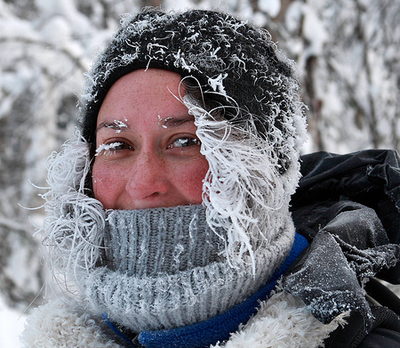Future Now
The IFTF Blog
Freezing Ourselves: Medicine of the Future?

When I was nine, I used to wonder whether it would be more painful to freeze to death or burn to death. I vividly imagined both scenarios, and decided that freezing would be the way to go - less pain overall.
Twenty-five years later, I'm coming back to the idea of freezing people, but as a way to save lives instead of a way to die.
In an earlier post, I mentioned some resources for extending life, or optimizing our "healthspans" - how long we can healthfully live. This was one of the forecasts at IFTF's Health Horizons conference in June. Cryonics, the practice of super-cooling bodes after medically-proclaimed death to preserve them for potential revival at a future date, was mentioned in passing.
Here is more about the science behind it.
First, an innovation announced this week coming out of Harvard Medical School and the Massachusetts General Hospital. Surgeons there are experimenting with cooling patients during surgery, to give the surgeons more time to work and help prevent brain damage associated with extended surgery.
They actually replace all of the patients' blood with a super-cold solution, inducing hypothermia and dropping the body temperature by more than twenty degrees.
-------
Dr Hasan Alam, the surgeon who is leading the research at Massachusetts General Hospital, said that often emergency patients suffering from gunshot wounds, stabbings and car accidents are on the brink of death anyway so by cooling their bodies so extensively it can protect their brain and organs from damage.
Dr Alam said trials of the technique in animals had shown it to be hugely successful.
He said: "If you drop the body's core temperature and brain temperature down to 15 degrees C or 10 degrees C you are talking about 60 minutes and even 190 minutes of protection.
"By cooling rapidly in this fashion we can convert almost certain death into a 90 per cent survival rate."
John Elefteriades, the cardiac surgeon behind the operations, has found that patients who have undergone this type of surgery suffer no long term impairment to their brain function.
He said: "The body is essentially in real life suspended animation with no pulse, no blood pressure, no electrical waves in the brain. We didn't find any evidence of functional impairment after the surgery."
-------
So the technology for being able to super-cool people and then warm them up again is definitely advancing - an early signal that will make cryonics fans happy.
Looking farther ahead, nanotechnology legend Ralph Merkle wrote this simple overview of cryonics:
-------
1. The purpose of cryonics is to preserve human life and restore health.
2. Today's medical technology can't always keep us alive, let alone healthy.
3. A future medical technology based on a mature nanotechnology should be able to preserve life and restore health in all but the most extreme circumstances.
4. Tissue preserved at the temperature of liquid nitrogen does not deteriorate, even after centuries of storage.
5. Therefore, if current medical technology can't keep us alive we can instead choose to be preserved in liquid nitrogen, with the expectation that future medical technology should be able to both reverse any cryopreservation injury and restore good health.
-------
Ralph isn't just wishing this - he's done the math. Lots of it. And he's probably one of the smartest people I know. Read his full overview here to learn more about cryonics than you ever knew existed. It is very thoroughly thought through.
My family just signed up, after a good period of cryo-crastination. We finally decided, hey, what have we got to lose? If it works, we get to live forever. If it doesn't, we die anyway. At least we've given life our best shot - which right now means, yes, freezing ourselves.
--
What do you think? Discuss this post online @accarmichael or @iftfhealth.
Photo credit: Alaskan Dude



